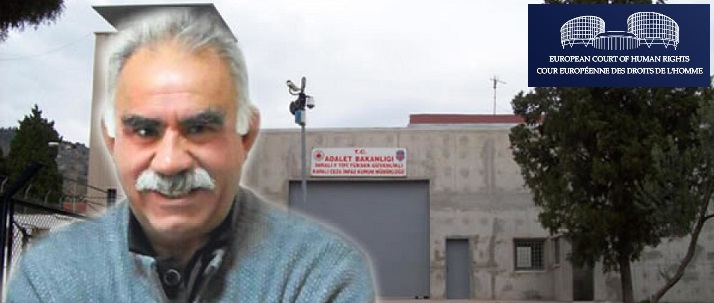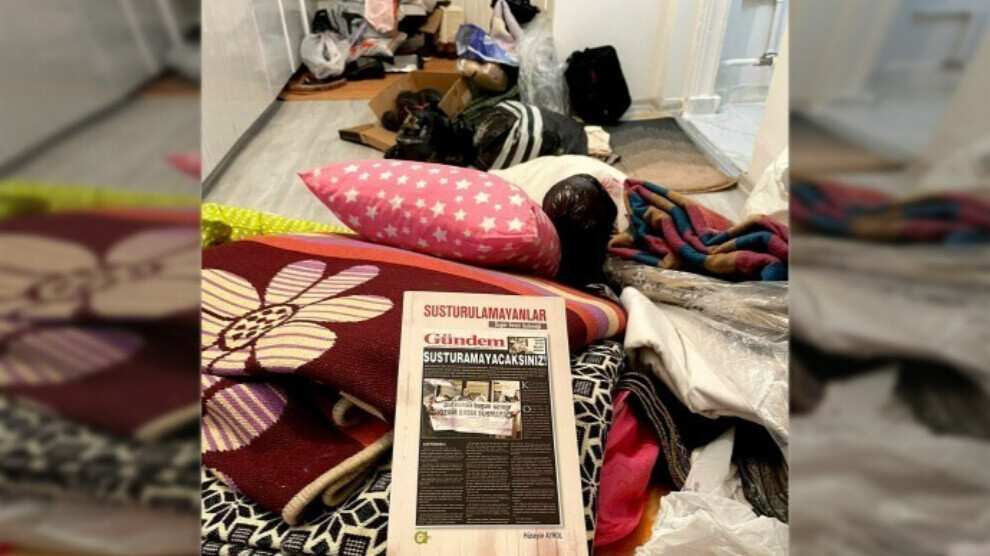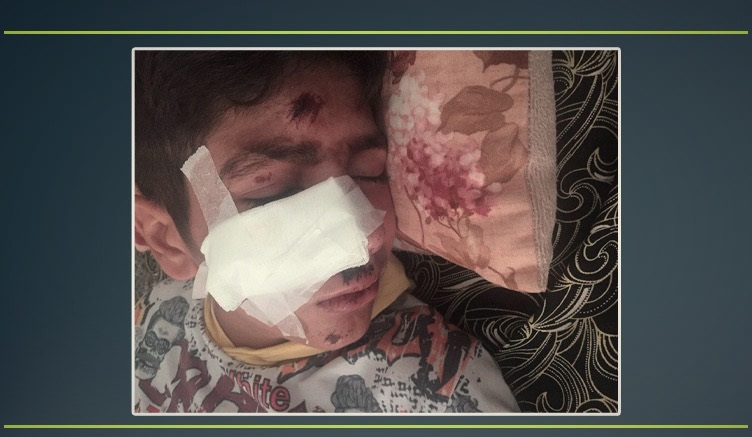
The European Court of Human Rights announced that they have rejected the appeal submitted in 2010, 8 years later.
The appeal submitted on March 2, 2010 to the ECHR had stressed violations of European Convention on Human Rights Article 2 regarding the right to life, Article 3 regarding the ban on torture, Article 6 regarding the right to a free trial, Article 13 regarding the right to effective appeal and Article 14 regarding the ban on discrimination.
CPT, THE ORGANIZATION LEGITIMIZING IMRALI
The court mentioned that the Committee for the Prevention of Torture (CPT) met with Öcalan in January 2010 and issued a report that said he “was not subjected to torture”.
The reports published by the CPT after their visit to Imrali in January 2010 had argued that the material conditions of Öcalan’s arrest were “generally acceptable”, choosing to legitimize the situation.
The ECHR is expected to make the detailed verdict public during the day.
HISTORY OF THE CASE
The case in the ECHR is about the attack and death threat Kurdish People’s Leader during a cell search in 2008. In October 2008, Öcalan’s lawyers and 236 prisoners had appealed to the Bursa public prosecutor’s office on grounds that Öcalan was subjected to torture and death threat.
In a press conference held on October 18, 2008, Öcalan’s lawyers said: “Öcalan’s room was rummaged completely by wardens with the excuse that they were conducting a search. He himself was removed from the room and taken to the cell next door. When he objected, he was told, ‘Shut up, you can’t speak, you have no right to utter a word.’ Two wardens took him by the arms, another pushed him from behind and he was made to kneel. This is a method of torture. When he said, ‘I’d rather die than be treated this way,’ one of the wardens said, ‘That time will come too,’ openly threatening his life.”
Protests were held in the streets for days after this attack, after which two of the wardens that attacked Öcalan were subjected to a disciplinary hearing but nothing came out of them. The Yalova Criminal Court rejected the appeal in July 2009. There is no legal authority in Turkey that can inspect the conditions in Imrali.
The appeal submitted on March 2, 2010 to the ECHR had stressed violations of European Convention on Human Rights Article 2 regarding the right to life, Article 3 regarding the ban on torture, Article 6 regarding the right to a free trial, Article 13 regarding the right to effective appeal and Article 14 regarding the ban on discrimination.
ECHR AND CPT HAND IN HAND
The silence of Western governments and international organizations in recent years in face of the isolation in Imrali has been confirmed with the ECHR verdict. The Council of Europe Committee for the Prevention of Torture (CPT) prepared a report on their visit two years ago, instead of identifying the current conditions.
The CPT report based on a visit in 2016 voiced concerns that Öcalan and other prisoners have no contact with the outside world and added that the situation was getting worse. The CPT had called on Turkish authorities to take precautions to allow for prisoners to meet with their families and lawyers when they wished. Despite these points, the Turkish state never actually implemented any of the suggestions in the report.
The CPT legitimized the isolation and inhumane conditions in Imrali with this report, while the ECHR’s verdicts in past years added to the silence. The latest verdict by the ECHR came at a time when the fascist regime continues to institutionalize and Turkish President Recep Tayyip Erdogan is looking to improve relations with Europe.
The ECHR had issued a verdict in 2014 rejecting the appeal Öcalan’s lawyers made by adding documents to the case in 2007 about the state wanting to “slowly kill Öcalan in prison by poisoning”, based on medical reports provided by the Turkish government and the CPT documents. That appeal had been submitted in 2003. The ECHR had argued that the conditions of arrest had been compatible with the European Convention on Human Rights after 2009. How isolation complies with human rights is a question that still begs an answer.
LEGITIMIZING THE ISOLATION
The ECHR verdict and the CPT announcing their report come at a time when the isolation imposed upon Öcalan is stricter than ever. Öcalan hasn’t been able to meet with his lawyers since 2011, and he has been completely cut off from the outside world since April 2015.
The most recent appeal by his family submitted in September was rejected on grounds that Öcalan received a disciplinary punishment. The Prosecutor’s Office announced that they won’t be allowing any meetings due to the disciplinary punishment Öcalan was issued on September 14, 2018 by the Imrali Type F High Security Prison Disciplinary Council. Öcalan’s family and lawyers were not given any information on the punishment.
Since Kurdish People’s Leader Abdullah Öcalan was taken hostage with the international conspiracy, the Turkish state has resorted to isolation due to his reflection in society and politics and his paradigms in favor of the Middle Eastern peoples.
An important recent development came to pass on the Bursa Chief Public Prosecutor’s Office’s demand. The Bursa Executive Court No.1 issued a new verdict for Öcalan and other prisoners in Imrali, Hamili Yıldırım, Ömer Hayri Konar and Veysi Aktaş. The verdict dated September 6, 2018 bans lawyer meetings for 6 months. The Bursa Chief Public Prosecutor’s Office appealed to the Bursa Executive Court No.1 and cited 11 separate counts of solitary confinement punishments issued between 2005 and 2009 and the disciplinary council verdict regarding a 156-page letter in 2009 as the reason for the demand for the ban.
The Prosecutor’s Office cited another reason as: “[…] the convicts who are members of a terrorist organization have had their visits with their lawyers leaked to the press in the past. It has been discussed among the public at the time that the convict Abdullah Öcalan continued to run his organization through orders given in these meetings. Allegations that lawyers have facilitated communication between the convicts and the terrorist organization or other criminal organizations and that the orders convict Abdullah Öcalan gave in visits with his lawyers constitute crimes […]”
Turkish judiciary claimed that as “it is understood that the convict may again issue orders through the other convicts in the same facility,” Öcalan and other convicts should be barred from meeting with their lawyers for 6 months. The Bursa Executive Court No.1 has accepted this demand and the appeal submitted by the lawyers against the verdict has been rejected.
NO MEETINGS SINCE 2011
Asrin Law Office lawyers haven’t been able to meet with their client Öcalan since July 27, 2011. Each one of the 100 lawyer appeals and 44 family appeals submitted in 2017 have been arbitrarily rejected with reference to the unlawful verdict by the Bursa Executive Court. As such, the situation where the 3 other prisoners transferred to the Imrali Island Prison haven’t been able to meet with their family or lawyers since continued.
The only contact after the meeting on April 5, 2015 the HDP committee held was the family visit on September 11, 2016 that happened only after over 50 Kurdish politicians held a hunger strike. There has been no contact with Öcalan or the other 3 prisoners since then, including any forms of letters, telegrams or faxes. It has similarly been impossible to reach them with mail from the outside.
HELD ALONE FOR YEARS
Öcalan was held in Imrali on his own from February 16, 1999 to November 17, 2009. 5 prisoners were transferred to the island afterwards, but he was still in a solitary ward, allowed to meet with the other prisoners for up to 5 hours a week. This meant not that the isolation had ended, but rather transformed and now included others.
THREAT TO HIS LIFE
Recently concerns and doubts regarding Öcalan’s health and safety have increased. There were claims regarding Öcalan’s life in October 2017. On October 13, Bursa Chief Public Prosecutor Ugurhan Kus issued a written statement, which was far from satisfactory in terms of information it provided. It was far from serious, referring to Öcalan like a “regular prisoner”. KCK issued a statement demanding the clarification that such news were not true, and said, “It is a most fundamental right for his family, his lawyers and the public to know about Leader Apo’s health.”
INTERNATIONAL DELEGATION LEFT WITHOUT RESPONSE
On top of the lawyers and Öcalan’s family, an international delegation made up of European Parliament MPs, trade unionists, academics and human rights activists from various countries requested a meeting with the Ministry of Justice. The delegation requested to visit the Imrali Island Prison on February 17-18-19, 2017 but the appeal was left without a response.
ECHR: TORTURE AND MISTREATMENT
Öcalan’s conditions had been identified as “torture and mistreatment” by the European Court of Human Rights (ECHR) Second Section on March 14, 2014. The Asrin Law Office agreed: “Mr. Öcalan hasn’t been able to exercise any of the rights the Execution of Sentences and Security Measures Act No.5275 defines, these rights have been all-out obstructed.”
CPT’S IRRESPONSIBILITY
The Committee for the Prevention of Torture (CPT) hasn’t performed in a way that fulfills their responsibility towards the isolation/torture in Imrali. The institution has the authority to visit prisons and write reports on the rights violations they encounter, as an organ of the Council of Europe of which Turkey is a member. The CPT held a visit to the Imrali Prison on April 28-29, 2016 but hasn’t published this report, unlike in their 6 previous visits, because Turkey didn’t approve the report for publication. The CPT had reported numerous rights violations in the Imrali Prison in previous visits and posed suggestions for their alleviation, and the institution receives criticism for remaining silent in the face of the absolute lack of any form of communication with the prison today.




